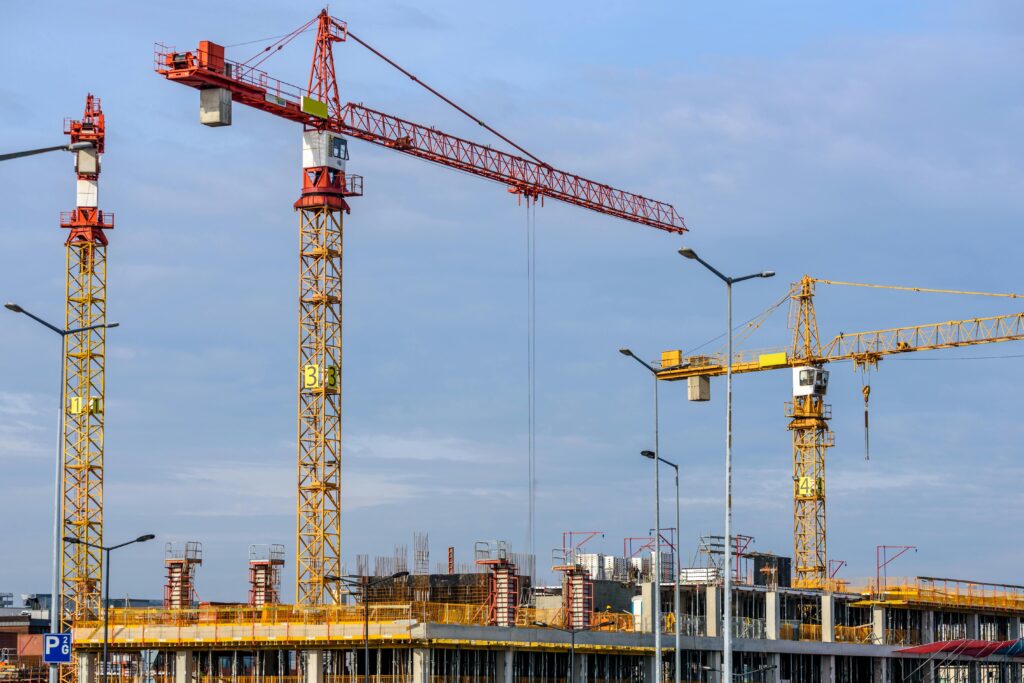Civil engineering in Nigeria is experiencing a transformative era driven by cutting-edge technologies and innovative practices. These advancements address the nation’s infrastructure challenges, from urban development and transportation to sustainable construction and disaster resilience. Let’s delve into the latest innovations shaping the civil engineering landscape in Nigeria, highlighting key projects, technologies, and practices.
- Sustainable Construction Practices
Sustainability is now a core focus in civil engineering, and Nigeria is embracing various sustainable construction practices to minimize environmental impact and ensure resource efficiency.

http://credits to : pexels Vladimir Srajber
Green Building Materials: Nigerian construction increasingly uses eco-friendly materials like recycled concrete, bamboo, and locally sourced resources. These materials help reduce the carbon footprint and promote sustainability.
Energy-Efficient Designs: Engineers are integrating energy-efficient designs, incorporating passive solar design, natural ventilation, and high-performance building envelopes. Features like green roofs and reflective coatings minimize energy consumption, promoting a greener environment.
Water Management Systems: Effective water management is crucial in Nigeria, given the country’s susceptibility to both drought and flooding. Innovations such as rainwater harvesting systems, greywater recycling, and permeable pavements help manage water resources sustainably, reducing wastage and flood risks.
- Advanced Construction Technologies
Advanced technologies enhance efficiency, reduce costs, and improve Nigerian construction project outcomes.

Building Information Modeling (BIM): BIM revolutionizes construction planning, design, and management by creating detailed 3D models. This technology helps identify potential issues early, streamline workflows, and improve stakeholder collaboration.
3D Printing: Though early, 3D printing shows promise for rapidly producing building components, reducing construction time and labour costs. It also allows for creating complex geometries that are difficult to achieve with traditional methods.
Drones: Drones provide high-resolution aerial imagery and 3D mapping, enabling engineers to monitor construction sites, track progress, and inspect structures efficiently. This enhances safety and project accuracy.
- Infrastructure Resilience
Nigeria faces challenges related to infrastructure resilience, including natural disasters, climate change, and urbanization. Innovative engineering solutions are being developed to create more resilient infrastructure.

Earthquake-Resistant Designs: Recent seismic activity has highlighted the need for earthquake-resistant designs. Engineers are incorporating advanced materials and techniques to enhance the seismic resilience of buildings and bridges.
Flood Mitigation Systems: Flooding is a significant concern in many parts of Nigeria. Innovative flood mitigation systems, such as elevated structures, flood barriers, and improved drainage systems, are being implemented to reduce flood risks and protect communities.
Intelligent Infrastructure: Integrating innovative technologies into infrastructure projects is a growing trend. Smart sensors and monitoring systems provide real-time data on infrastructure conditions, enabling proactive maintenance and timely interventions, particularly for critical infrastructure like bridges and roads.
- Transportation Innovations
Efficient transportation systems are vital for Nigeria’s economic development and urban mobility. Several innovative projects are transforming the country’s transportation infrastructure.

Rapid Transit Systems: Cities like Lagos and Abuja are investing in rapid transit systems to alleviate traffic congestion and improve public transportation. Projects such as the Lagos Light Rail and Bus Rapid Transit (B.R.T.) systems offer fast, reliable, and affordable transportation options.
Smart Traffic Management: Smart traffic management systems optimize traffic flow and reduce congestion using real-time data from sensors, cameras, and G.P.S. devices. These systems manage traffic signals, monitor road conditions, and provide up-to-date traffic information.
Innovative Road Construction Techniques: Advanced techniques, such as cold recycling and geosynthetics, are improving the durability and sustainability of Nigerian roads. These methods enhance road performance, reduce maintenance costs, and extend infrastructure lifespan.
- Educational and Professional Development
Continuous professional development is essential for maintaining high standards and fostering innovation in civil engineering. Nigerian institutions and organizations play a vital role in this regard.
Professional Certification Programs: Organizations like the Nigerian Society of Engineers (NSE) and the Council for the Regulation of Engineering in Nigeria (C.O.R.E.N.) offer certification programs promoting best practices and industry standards, ensuring engineers have the necessary skills to implement innovations.
University Partnerships: Nigerian universities partner with international institutions to provide advanced engineering education and research opportunities, facilitating knowledge exchange and resource sharing.
Industry Conferences and Workshops: Regular industry conferences, workshops, and seminars offer platforms for engineers to share insights, learn about new technologies, and network with peers. Events like the Nigerian International Building Exhibition (N.I.B.E.X.) and the West Africa Building and Construction (W.A.B.C.) showcase innovations and foster collaboration.
- Case Studies of Innovative Projects
Notable civil engineering projects in Nigeria illustrate the impact of these innovations:
Eko Atlantic City: This ambitious project aims to create a sustainable, resilient urban development on reclaimed land off Lagos’ coast. Eko Atlantic City features advanced infrastructure, green spaces, and modern amenities, incorporating innovative construction techniques and materials to withstand sea-level rise and coastal erosion.
Lekki Deep Sea Port: One of West Africa’s most significant infrastructure projects, the Lekki Deep Sea Port aims to boost Nigeria’s maritime trade and logistics efficiency. The project utilizes advanced engineering solutions, including deep-water dredging, high-capacity cranes, and automated systems.
Abuja Smart City: The Abuja Smart City project aims to transform Nigeria’s capital into a high-tech urban centre, developing smart buildings, intelligent transportation systems, and digital infrastructure. Integrating innovative technologies enhances residents’ quality of life and promotes sustainable urban development.
- Future Trends and Challenges
Several trends and challenges are likely to shape the future of civil engineering in Nigeria:
Increased Focus on Sustainability: The demand for sustainable construction practices will grow, driven by environmental concerns and regulatory requirements. Engineers must find innovative ways to minimize environmental impact and promote resource efficiency.
Adoption of Digital Technologies: Adopting digital technologies, such as artificial intelligence, machine learning, and the Internet of Things (IoT), will revolutionize civil engineering. These technologies enable predictive maintenance, optimize project management, and improve decision-making.
Infrastructure Financing: Securing financing for large-scale infrastructure projects remains a challenge. Public-private partnerships (PPPs) and innovative financing models will be crucial in bridging the funding gap and ensuring successful project implementation.
Skills Development: Continuous professional development and training are essential to keep pace with technological advancements. Engineers must acquire new skills and knowledge to leverage the latest innovations effectively.
- Interactive Elements and Engagement
To make this article more interactive, consider incorporating the following elements:
Polls and Surveys: Include polls or surveys to gather readers’ opinions on key topics. For example, ask readers about their views on the most critical innovation in Nigerian civil engineering or their experiences with sustainable construction practices.
Infographics and Visuals: Use infographics and visuals to illustrate complex concepts and data. For instance, create a visual timeline of major civil engineering projects in Nigeria or an infographic highlighting the benefits of BIM in construction.
Call-to-Action: In the comments section, encourage readers to share their thoughts and experiences. Pose questions like, “What innovative projects have you been involved in?” or “How do you see the future of civil engineering in Nigeria?”
Quizzes: Add interactive quizzes to test readers’ knowledge about civil engineering innovations. For example, create a quiz on the latest technologies in construction or the history of major infrastructure projects in Nigeria.
Conclusion
The latest innovations in civil engineering are transforming Nigeria’s infrastructure landscape. From sustainable construction practices and advanced technologies to resilient infrastructure and efficient transportation systems, these developments address the country’s infrastructure challenges and drive economic growth. By staying abreast of these innovations and embracing new technologies, Nigerian civil engineers can continue building a brighter, more sustainable future for the nation.
For civil construction services, consider contacting Abenego Engineering Ltd. We specialize in delivering innovative solutions tailored to your needs. Reach out to us at:
Corporate Head Office:
Block 95 Flat 1,
Ijaiye Housing Estate,
Ogba Ikeja, Lagos
Nigeria
Email: info@abenegoglobal.com
Call: +234-8034139285
